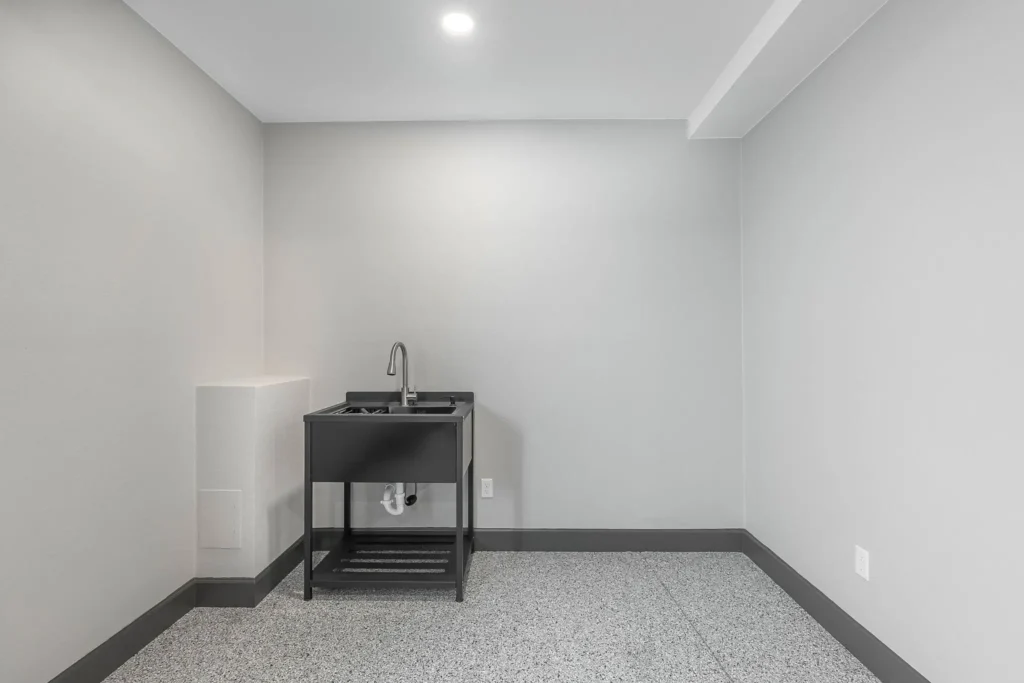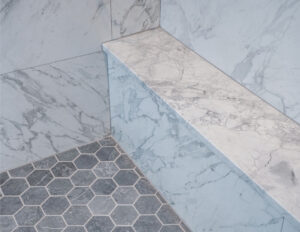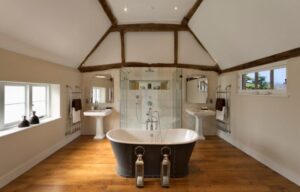Denver’s Best Materials For Durable Outdoor Decking: Let’s Build Something That Lasts!
Okay, Denver folks, let’s talk decks. We get it – those epic mountain views practically demand a killer outdoor space to soak ’em in with a cold one. But here’s the kicker: our beloved Mile High weather? Yeah, it’s beautiful, but it’s also brutal on outdoor structures. Intense UV rays baking everything to a crisp half the year, followed by snow, ice, freeze-thaw cycles that would make lesser materials cry uncle. Ever seen a deck warp, crack, or fade into oblivion after just a few seasons? Yeah, we have too. It’s like watching your investment slowly melt away. Not cool.

We’ve been building and fixing decks across Denver for years (yep, that’s us at Verified Builders!), and we’ve seen the good, the bad, and the downright ugly when it comes to materials. Choosing the right decking isn’t just about looks; it’s about picking a warrior that can stand up to 300 days of sunshine, sudden hailstorms, and our infamous temperature swings. So, grab your favorite local brew, settle in, and let’s break down the best durable outdoor decking materials that actually make sense for our unique backyard battleground. We promise no overly technical jargon, just straight talk from folks who’ve been in the trenches.
Why Denver’s Weather is Your Deck’s Worst Nightmare (And What To Do About It)
Seriously, what doesn’t Denver weather throw at us? One minute it’s a gorgeous 75-degree spring day, the next you’re scrambling to cover the grill before a surprise snow dump. This constant yo-yoing wreaks havoc on decking. Here’s the main culprits:
- UV Radiation: Higher altitude means more intense sun. This bleaches colors, dries out wood, and can make some synthetics brittle or fade unevenly. That gorgeous rich brown you picked? Might be a sad, washed-out grey in two summers if you choose poorly.
- Freeze-Thaw Cycles: Water gets into tiny cracks or pores. It freezes, expands, and pop – now you have bigger cracks. Repeat ad nauseam. This is the arch-nemesis of many materials.
- Moisture & Humidity: Snow melt, spring rains, summer thunderstorms… moisture is always lurking. It leads to rot in wood, mold/mildew on composites if not cleaned, and can cause warping or swelling.
- Temperature Extremes: Swinging from sub-zero winters to scorching summer deck temperatures stresses materials, causing expansion and contraction that can loosen fasteners and distort boards.
So, what’s the magic formula for a Denver-tough deck? We look for materials that offer:
- Serious UV Resistance: Fade warranties are your friend here.
- Low Moisture Absorption: Less water soaking in means less damage from freezing and less chance of rot/mold.
- Dimensional Stability: Minimal expansion and contraction with temperature changes = fewer gaps, pops, and squeaks.
- Inherent Strength & Durability: It needs to handle foot traffic, furniture, grills, and maybe the occasional enthusiastic dog without showing excessive wear.
Denver’s Decking Champions: Materials That Earn Their Stripes
Alright, let’s get into the contenders. Forget the flimsy stuff; we’re focusing on what truly lasts in our backyard colosseum. We’ve installed mountains of this stuff, and here’s our honest take:
Composite Decking: The Low-Maintenance Workhorse (Our Top Pick for Busy Folks)
Look, we love the idea of natural wood. But the reality of constant staining, sealing, and sanding? For most Denverites, it’s a hard pass. Enter composite decking – the reigning champ for folks who want beauty and their weekends back. Made from a blend of wood fibers and plastic (usually recycled, which is a nice bonus!), composites have come a LONG way from the early, fake-looking versions.
- Why it Rocks for Denver:
- UV Resistance: Top brands offer excellent fade warranties (25+ years is common). The color goes all the way through the board (capped composite), so minor scratches don’t show a different color underneath.
- Moisture? What Moisture?: Virtually no absorption. Snow melts? No problem. Spilled your IPA? Wipe it up. Freeze-thaw cycles barely phase it.
- Stability: Expands and contracts much less than wood. Fewer gaps, fewer popped screws.
- Maintenance: Hallelujah! Just occasional soap-and-water cleaning. No sanding, no staining, no sealing. Ever. This alone makes it worth its weight in gold for many homeowners we work with at Verified Builders.
- Things to Note:
- Cost: Higher upfront cost than pressure-treated wood, but you save big on maintenance and longevity. Think long-term investment.
- Heat: Darker colors can get hot underfoot in direct summer sun (like most materials, honestly). Lighter colors stay cooler. Some brands offer “cool deck” technology.
- Feel: It doesn’t quite feel like real wood underfoot, but modern textures are very convincing visually.
PVC Decking: The Ultra-Resistant Contender
Take the plastic part of composite and run with it. PVC decking is 100% plastic. It’s the superhero of moisture resistance and is incredibly durable.
- Why it Rocks for Denver:
- Waterproof Champion: Absolutely nothing absorbs less water. Perfect for areas prone to puddling or if you’re building over a basement (hey there, basement remodel contractors take note for transitions!).
- Stain & Mold Resistance: Spills wipe right off. Mold and mildew have a really hard time gaining a foothold. Great for shaded areas.
- Durability: Resistant to scratches, dents, and insects. Tough as nails.
- Stability: Similar to composite, very low expansion/contraction.
- Things to Note:
- Cost: Usually the most expensive option upfront.
- Look & Feel: Can sometimes look a bit more “plastic-y” than high-end composites, though textures are improving. Can feel hotter than composites in direct sun.
- Expansion: While stable, it can expand/contract more than composite in extreme heat if not installed perfectly (which is why professional installation is key – more on that later!).
Pressure-Treated Wood: The Budget Warrior (Handle With Care)
Ah, the classic. It’s readily available, affordable, and when properly maintained, can last a decent while. But “properly maintained” is the operative phrase here, folks. This isn’t a “set it and forget it” material in Denver.
- Why it Can Work (with Effort):
- Cost: Significantly cheaper upfront than composites or PVC.
- Availability: Easy to find at any lumberyard near you.
- Strength: Structurally sound when installed correctly.
- Why Denver Chews It Up:
- Maintenance Nightmare: Requires annual cleaning, and re-staining or sealing every 1-3 years. Skip this, and it quickly becomes a cracked, warped, gray mess. Seriously, it’s a part-time job.
- Moisture & Rot: Even pressure-treated wood absorbs water and is susceptible to rot over time, especially at cut ends and where fasteners penetrate. Our freeze-thaw cycles accelerate this.
- Warping & Checking: Dimensional stability isn’t great. Expect boards to cup, twist, and develop cracks (checking).
- Chemical Concerns: Older treatments (CCA) had issues; newer ACQ treatments are safer but are highly corrosive to standard fasteners – you MUST use hot-dipped galvanized or stainless steel hardware. FYI, forgetting this step leads to rust stains and loose boards fast.
Tropical Hardwoods (Ipe, Garapa, Cumaru): The Luxury Natural Option
Want that stunning, rich, natural wood look that turns heads? Exotic hardwoods deliver. They’re incredibly dense and naturally resistant to rot and insects. But… they come with caveats (and a hefty price tag).
- Why They’re Impressive:
- Natural Durability: Can last 25-50+ years with proper care. Resists rot, decay, and bugs like a fortress.
- Unmatched Beauty: That deep, rich grain and color is hard to replicate synthetically. Screams luxury.
- The Denver Downsides:
- Cost: Very expensive, both for materials and installation (it’s hard stuff to work with!).
- Maintenance: Still needs annual cleaning and oiling to maintain color and prevent graying/silver patina (some love this look, some hate it). Without oil, it will fade to gray.
- Hardness: Incredibly dense, requiring pre-drilling for every fastener. Installation takes longer = higher labor costs.
- Sourcing & Sustainability: Concerns exist about responsible sourcing. Look for FSC-certified wood.
- Heat: Gets very hot in direct sun.
Aluminum Decking: The Modern, Industrial Strength Option
Think beyond the patio furniture! Aluminum decking systems are gaining traction for good reason. They’re lightweight, incredibly strong, and virtually impervious to the elements.
- Why it’s a Dark Horse Winner:
- Weatherproof King: Completely impervious to water, rot, insects, mold, and mildew. UV rays? Barely a scratch. Denver weather? Bring it on.
- Cool Underfoot: Reflects heat instead of absorbing it. The coolest option for bare feet on a hot day.
- Lightweight & Strong: Easy to handle during installation, yet holds significant weight. Great for rooftop decks or complex structures.
- Fire Resistance: Non-combustible. A major plus in our wildfire-prone region.
- Zero Maintenance: Hose it off. Done.
- Things to Note:
- Cost: Typically the highest upfront investment (think luxury home renovations territory).
- Look & Feel: Has a distinct modern, industrial aesthetic. It doesn’t mimic wood grain. You hear a slight “hollow” sound when walking on some systems.
- Dent Potential: While strong, a dropped heavy tool or piece of furniture can dent it (though it won’t crack or splinter).
Choosing Your Champion: A Side-by-Side Showdown
Okay, that was a lot of info! Let’s boil it down into something digestible. Here’s a quick comparison based on what matters most for Denver durability:
| Feature | Composite | PVC | Pressure-Treated Wood | Tropical Hardwood | Aluminum |
|---|---|---|---|---|---|
| Upfront Cost | $$$ | $$$$ | $ | $$$$+ | $$$$+ |
| Lifespan | 25+ years | 25+ years | 10-15 years (w/ maint) | 25-50+ years | 50+ years |
| Denver UV Resistance | Excellent (Capped) | Excellent | Poor (Fades Gray) | Good (w/ Oil) | Excellent |
| Moisture/Freeze-Thaw | Excellent | Excellent | Poor | Very Good | Excellent |
| Maintenance | Very Low | Very Low | High (Annual) | Moderate-High | None |
| Heat Retention | Medium-High | Medium-High | Medium | High | Low |
| Real Wood Look | Very Good | Good | Good | Excellent | No |
Beyond the Material: What Else Makes a Denver Deck Last?
Picking the right boards is only half the battle. How it’s built is just as crucial. Here’s what we obsess over at Verified Builders to ensure your deck is a Denver survivor:
- Professional Installation is NON-Negotiable: Seriously. We’ve fixed too many DIY disasters and fly-by-night contractor messes. Proper framing, correct spacing for expansion/contraction, using the right fasteners for the material (hidden clips vs. screws? Stainless steel?), ensuring proper drainage and ventilation underneath… these details make or break a deck’s lifespan. A great general contractor or dedicated deck builder knows these inside out. Don’t just search “deck builders near me”; look for proven expertise and solid reviews.
- Ventilation is Key: Trapped moisture under your deck is a silent killer. Ensure there’s good airflow underneath to prevent rot on the framing and mold growth, especially with composites/PVC over a basement remodel space. Proper skirting design matters!
- Framing Matters Too: Your beautiful decking sits on a skeleton. Using quality, properly treated lumber (or steel!) for the frame is essential. Don’t let a cheap frame undermine your expensive decking choice.
- Consider the Microclimate: Is your deck in full sun all day? Heavily shaded? Exposed on a windy ridge? Near sprinklers? These factors might nudge you towards one material over another (e.g., full sun might make aluminum’s coolness or composite’s fade warranty more appealing; heavy shade might push you towards PVC for mold resistance).
Why You Might Hear From Us About More Than Just Decks…
While decks are our passion (and we think we’re pretty darn good at them!), building durable outdoor spaces often connects to the rest of your home. Maybe that deck project sparks the idea for a whole house remodeling refresh? Or perhaps you realize your dated kitchen doesn’t flow onto your gorgeous new composite paradise? That’s where the full scope of a remodeling company like ours comes in.
Whether you need a bathroom renovation contractor to finally fix that leaky shower, a home addition contractor to add much-needed space, or a basement contractor to transform that dungeon into a killer entertainment zone, having one trusted team handle it all ensures consistency, quality, and avoids the headache of juggling multiple nearest specialists. Think seamless design, unified project management, and tradespeople who already know how we work. We handle custom remodels big and small, from bathroom remodeling to luxury home renovations. So, while we’re talking decks today, remember we’re your closest partner for making your entire Denver home awesome. Just saying! 🙂
Your Denver Deck Questions, Answered (The Stuff You’re Really Wondering)
Let’s tackle some of the most common questions we get right here in Denver:
-
“Composite vs. PVC: Which is REALLY better for Denver?”
This is the million-dollar question! Honestly, both are fantastic, durable choices that outperform wood here. Composite generally wins on achieving a more realistic wood look and feel. PVC wins on ultimate moisture resistance and stain/mold prevention, making it ideal for very wet areas, around pools, or heavily shaded spots. For most Denver applications with standard sun exposure, high-quality capped composite is often the sweet spot for balance. But you can’t go wrong with either for longevity. IMO, it often comes down to budget and aesthetic preference. -
“Is pressure-treated lumber really THAT bad? It’s so much cheaper!”
Look, it’s not bad if you go in with eyes wide open. It’s a budget-friendly way to get a deck built. But, you absolutely MUST commit to rigorous, annual maintenance (cleaning, inspecting, re-sealing/staining). You MUST use the correct corrosion-resistant fasteners. And even then, expect more warping, cracking, and eventual replacement sooner than synthetics or hardwoods. For many folks, the lower upfront cost is eaten up by maintenance time, materials, and shorter lifespan. Calculate the true long-term cost before deciding. It’s like that cheap toolbox that breaks in a year vs. the solid one that lasts a decade. -
“How much does a durable Denver deck actually cost?”
Ah, the classic “how long is a piece of string?” question! It varies wildly based on size, materials chosen, complexity of design (multi-level? Lots of stairs? Built-in seating?), site access, and the home renovation contractor you hire. As a very rough ballpark for material costs only per square foot installed in Denver:- Pressure-Treated: $15 – $25
- Composite: $45 – $65+
- PVC: $55 – $75+
- Tropical Hardwood: $60 – $100+
- Aluminum: $70 – $120+
Remember, this is JUST the decking material cost. Framing, footings, railings, stairs, labor, permits – they all add significantly. A basic pressure-treated deck might start around $30-$40/sq ft total, while a high-end composite or aluminum deck can easily hit $100+/sq ft or more. The best way? Get quotes from a few reputable nearby builders (like, ahem, Verified Builders!) for your specific project. 🙂
Let’s Build Your Denver-Deck-Defying Oasis!
Phew! That was a deep dive into the world of durable Denver decking. We’ve covered the contenders, the climate challenges, the hidden installation secrets, and hopefully busted a myth or two. The bottom line? Invest in quality materials (composite, PVC, aluminum, or properly maintained hardwood) and partner with a pro who knows Denver – like the team right here at Verified Builders. Skipping on either is asking for trouble down the line.
We’re not just slinging decks; we’re building the outdoor living rooms where you’ll grill for friends, watch the sunset over the Front Range, and make memories for decades. We take pride in crafting spaces that stand up to everything Colorado throws at them, without you needing to become a full-time deck refinisher.
So, are you ready to ditch the deck drama and build something truly lasting? Give Verified Builders a shout. Let’s chat about your vision, your budget, and find the perfect durable decking solution for your unique Denver slice of paradise. We promise a straightforward process, expert craftsmanship, and maybe even a few laughs along the way (we try not to take ourselves too seriously, even when we’re geeking out over fastener types). Your dream deck, built Denver tough, is waiting. Let’s get started!


